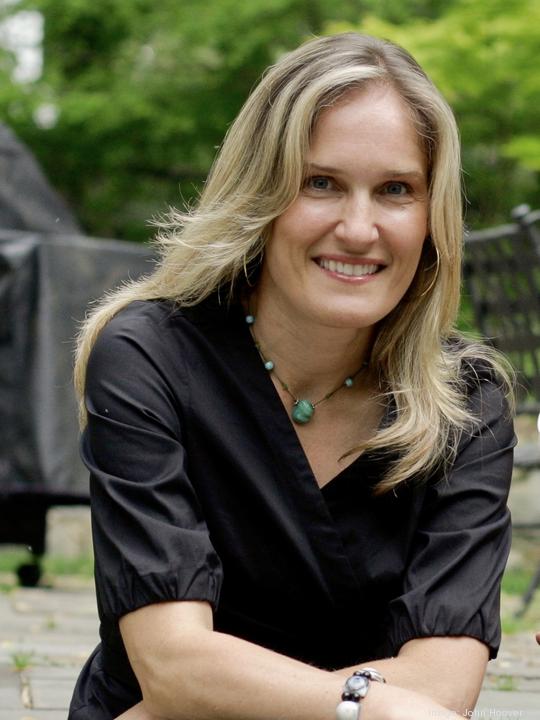
About the business: Lunchskins produces sustainable alternatives to single-use plastics, largely sandwich bags and straws.
How it started: It launched in the late 2000s, said founder Kirsten Quigley, “from a very humble and grassroots beginning in my home” in Bethesda. The search for sustainable sandwich bags to replace the single-use, plastic bags she used for her four kids’ lunches came up empty. There was a need to fill — and dumps to stop filling.
Lunchskins 1.0 was a reusable, dishwasher-safe sandwich bag made out of fabric, a “specialty gift” sold in boutique shops to replace traditional bags. Lunchskins 2.0, launched in 2018, represented essentially a relaunch as it rolled out sealable paper bags that could be recycled or reused, which was a more affordable product line geared toward the mass market.
But it came with the same mission of sustainability, of shifting minds away from the “ludicrous and overpackaged” foods of today, Quigley said.
“There’s a lot of trash out there and it’s just really going into overstuffed landfills and ocean-fills,” she said. “It’s time to think long-term, think bolder and innovatively about how we’re going to eliminate it. It doesn’t need to be as prolific and excessive as it is.”
Lunchskins sells reusable, zippered sandwich bags; recyclable paper sandwich bags; compostable, unbleached sandwich bags with resealable adhesive; and biodegradable paper straws. Produced in China, for now, the products are sold by an increasing number of major chains, including the most recent addition, 350 Walmart stores, plus Whole Foods Markets, Sprouts, Target and Safeway — some 5,000 locations in all.
“So much of succeeding in mass market is execution,” Quigley said. “A great product will only get you in the door.”
Pandemic effect: No in-person school and few folks in the office meant little reason to buy Lunchskins throughout much of the pandemic. While 2020 started gangbusters, Quigley said, it stalled with the emergence of Covid-19.
“People were at home,” Quigley said. “We rely on people having an active lifestyle, being on the go. It just flatlined.”
While demand fell precipitously, Quigley continued to pursue opportunities for Lunchskins, figuring that, eventually, the pandemic would ease and some semblance of normalcy would return. At the same time, Quigley said, the pandemic brought to the fore a much greater awareness of equity and health — people and planet — while major corporations started focusing more on environmental, social and governance (ESG) programs.
“I kept knocking on doors, taking meetings,” Quigley said.
Her pitch: Lunchskins is a woman-owned small business that aligns well with a rise in ESG values for corporations and their consumers alike.
“The big stores, they plan six to 12 months out,” Quigley said. “They’re reading the tea leaves. Even if they’re not actually bringing products in, they know the appetite for sustainable products is not going away.”
The company had been generating annual revenue since 2009 in the $1 million to $2 million range, Quigley told the Washington Business Journal when it was featured in 2019. This year, she projects coming at the top end of that same range.
Pandemic pivot: The product didn’t change in 2020, but the method of bringing it to consumers did. As more stores took their business to the web, offering delivery and curbside order pickup, Lunchskins had to speed the expansion of its digital presence.
“Grocery stores went online, and we had to make sure we were with them lock step,” Quigley said. “That was an accelerated thing. We had to do it anyway — it just happened a lot faster.”
And while business slowed during the pandemic, Quigley did not let it slow her messaging, “really focusing on health, convenience and affordability.” Lunchskins will never compete, price-wise, with the likes of a Costco-sized package of Ziploc sandwich bags, “but if you get me in a grocery store, we’re comparable.”
“The choice to spend a penny or two more and feel good about what you’re buying and consciously throw it in your recycling bin or compost it, I think people are willing to pay that price for an authentic, mission-driven company,” she said.
The challenge today: Lunchskins hasn’t encountered an issue hiring qualified workers like so many other companies have — it employs five in its Bethesda headquarters and more in warehouses, but the product is manufactured in Asia. The challenge is getting its product to consumers while keeping prices manageable, Quigley said.
“Transportation and logistics costs have gone up significantly,” she said. “We’re bracing for delays. The hike in prices and the delay in shipping is unfortunate.”
What’s next: The company has, to this point, largely focused on the consumer market, but there’s another untapped market Quigley is eyeing for Lunchskins: food service. Her team has created a new product for school campuses, delis and the like. It hasn’t launched yet, but they’re getting ready to roll it out.
“All that prepackaged to-go food, that’s just the next step,” Quigley said. “We’re trying to play on that.”
In the meantime, she is looking to perhaps bring Lunchskins’ production back to the United States. The product was originally manufactured in Pennsylvania, but as demand grew, it was moved overseas.
“Oddly enough, good things come full circle as we have been looking, talking, trying to develop some of that capacity back to the U.S.,” Quigley said. “We keep looking for the ability to bring that back, but right now the focus is on scaling sustainability.”
Email mneibauer@bizjournals.com to share your business with us